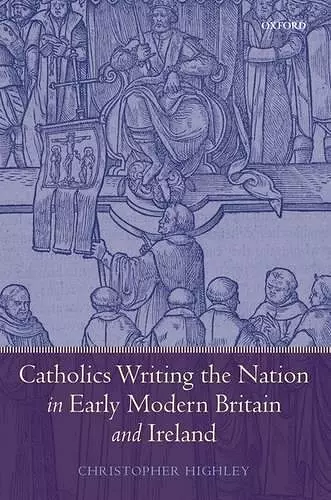Catholics Writing the Nation in Early Modern Britain and Ireland
Format:Hardback
Publisher:Oxford University Press
Published:10th Jul '08
Currently unavailable, and unfortunately no date known when it will be back

Modern scholars, fixated on the 'winners' in England's sixteenth- and seventeenth-century religious struggles, have too readily assumed the inevitability of Protestantism's historical triumph and have uncritically accepted the reformers' own rhetorical construction of themselves as embodiments of an authentic Englishness. Christopher Highley interrogates this narrative by examining how Catholics from the reign of Mary Tudor to the early seventeenth century contested and shaped discourses of national identity, patriotism, and Englishness. Accused by their opponents of espousing an alien religion, one orchestrated from Rome and sustained by Spain, English Catholics fought back by developing their own self-representations that emphasized how the Catholic faith was an ancient and integral part of true Englishness. After the accession of the Protestant Elizabeth, the Catholic imagining of England was mainly the project of the exiles who had left their homeland in search of religious toleration and foreign assistance. English Catholics constructed narratives of their own religious heritage and identity, however, not only in response to Protestant polemic but also as part of intra-Catholic rivalries that pitted Marian clergy against seminary priests, secular priests against Jesuits, and exiled English Catholics against their co-religionists from other parts of Britain and Ireland. Drawing on the reassessments of English Catholicism by John Bossy, Christopher Haigh, Alexandra Walsham, Michael Questier and others, Catholics Writing the Nation foregrounds the faultlines within and between the various Catholic communities of the Atlantic archipelago. Eschewing any confessional bias, Highley's book is an interdisciplinary cultural study of an important but neglected dimension of Early Modern English Catholicism. In charting the complex Catholic engagement with questions of cultural and national identity, he discusses a range of genres, texts, and documents both in print and manuscript, including ecclesiastical histories, polemical treatises, antiquarian tracts, and correspondence. His argument weaves together a rich historical narrative of people, events, and texts while also offering contextualized close readings of specific works by figures such as Edmund Campion, Robert Persons, Thomas Stapleton, and Richard Verstegan.
a serious contribution to the debate on Catholicism in early modern Britain. * Peter Davidson, Times Literary Supplement, *
...a carefully measured and well reasoned work of unremitting scholarship * Oliver Rafferty SJ, Thinking Faith: The Online Journal of the British Jesuits *
...captivating book...provides a fascinating insight into how English Catholics 'wrote the nation' at home and, above all, abroad..., the particular strength of this monograph lies in its excellent passages of political contextualisation. * Laurence Lux-Sterritt, The History of Women Religious of Britain and Ireland *
there is no doubt that Catholics Writing the Nation is an important contribution to the study of both Catholicism and the development of national identity in early modern England * The Innes Review *
Highley is exemplary in giving platform time to all nationalities, discriminating among them as acutely as they did themselves * Alison Shell, Review of English Studies *
... this is a well-written and appealing book ... this study sheds important light on the differing ways in which exiles negotiated and reconciled being both English and Catholic. * Katharine K. Olson, Sixteenth Century Journal *
ISBN: 9780199533404
Dimensions: 241mm x 163mm x 17mm
Weight: 577g
248 pages